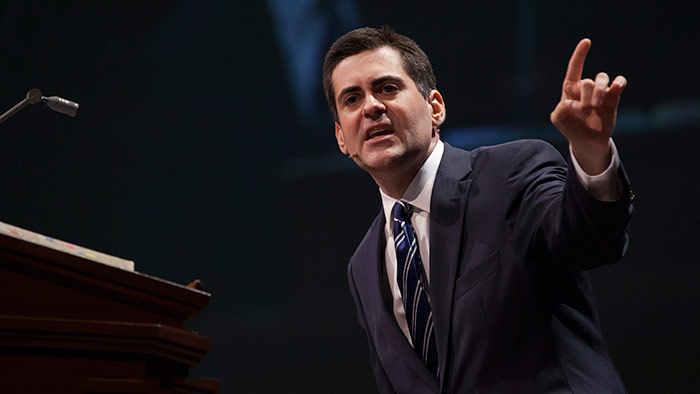“Now if any man builds on the foundation with gold, silver, precious stones, wood, hay, straw, each man’s work will become evident; for the day will show it because it is to be revealed with fire, and the fire itself will test the quality of each man’s work. If any man’s work which he has built on it remains, he will receive a reward. If any man’s work is burned up, he will suffer loss; but he himself will be saved, yet so as through fire.” 1 Corinthians 3:12-15
“How may I live without my name? I have given you my soul, leave my name!” Thus cries John Proctor, the protagonist of Arthur Miller’s classic play, The Crucible, as he prepares to meet his fate on the gallows of Salem, Massachusetts. Having been falsely accused and convicted of witchcraft, Proctor is offered clemency if he’ll only sign a confession. Holding his reputation in higher esteem than his life, Proctor refuses to sign the confession at the expense of his own life. Reputations are valuable and a good name isn’t something to be given up easily.
“A good name is to be more desired than great wealth, Favor is better than silver and gold.” Proverbs 22:1
In the wake of overwhelming “evangelical “support for the crass, playboy industrialist presidential candidate ,Donald Trump, believing American Evangelicals are facing something of identity crisis. For a long time, the term “evangelical” has been associated with a gospel-sharing, bible-believing commitment to honesty, hard-work and family values. Unfortunately, “The word ‘evangelical’ has become almost meaningless this year, and in many ways the word itself is at the moment subverting the gospel of Jesus Christ.” This is the observation of ERLC President, Russell Moore. According to Moore, “Many of those who tell pollsters they are ‘evangelical’ may well be drunk right now, and haven’t been into a church since someone invited them to Vacation Bible School sometime back when Seinfeld was in first-run episodes.” Moore is right. The word “evangelical” has become an embarrassment to true, bible-believing, doctrinally-centered Christians. How did it come to this? How did a man like Donald Trump come to dominate GOP primaries in Bible-Belt states like Georgia, Tennessee, and South Carolina? Moore places part of the blame on “the behavior of some evangelical leaders.” Moore is right…and he is one of those leaders.
Russell Moore has been all-too-willing to compromise evangelical holiness and distinctness for worldly cache. Moore has preached for the Pope, stood arm-and-arm with Roman Catholics as political co-belligerents, pushed a social justice agenda, and darn near turned the ERLC into a Rubio PAC. Moore’s tacit support of Rubio, quite frankly, makes his legitimate criticism of Trump supporters look like sour grapes. To make matters worse, Moore has engaged in another tactic which is typical of the weak-kneed evangelical leaders who have failed to protect the good reputations of evangelicalism…Moore has refused to name names.
In a recent article published in the Washington Post entitled Why this Election Makes me Hate the Word ‘Evangelical’, Moore wrote, “I watched one evangelical leader pronounce a candidate a Christian, though he explicitly states that he has never repented of sin, because he displays the fruit of the Spirit in job creation. That’s not a political problem; it’s a gospel problem.
The evangelical leader Moore is referring to is either Fox News personality and megachurch pastor Robert Jeffress or Liberty University President Jerry Falwell, Jr. Both have voiced support of candidate Trump and vouched for his Christianity. Trump has very notably claimed to be a Christian but has stated that he has never repented of sin. This is common knowledge. Yet, Moore doesn’t even name the names of the Christian leaders at fault for watering down the values of evangelicalism. Moore levels stern criticism, but like so many others keeps his hands clean of naming names. He, therefore, remains eligible to speak at the popular conferences and biggest churches. Naming names might get Moore on a blacklist. Moore isn’t alone in his passive-aggressive criticism. On Super Tuesday, as Trump won his state’s primary by a landslide, Georgia Baptist Pastor Mike Stone tweeted (and promptly deleted) the following statement, “shame the former Gov of Texas has more Biblical discernment than one of the Lone Star’s most famous SBC pastors” This is another dig at Robert Jeffress, who is quite frankly an embarrassment to Christianity. Yet, Stone won’t say that outright or even leave a statement that hints as such in print. If he did, it might put him on the blacklist.
However, a black list is exactly what American evangelicalism needs. Evangelical leaders should clearly identify and polemicize faux-Christians, false teachers, “Christian” publishing (read: Beth Moore), “Christian” music (read: Hillsong), and shameful preachers (read: Christine Caine). It’s way past time to name names. Will you join Pulpit & Pen in preserving the reputation of the church? Or will we go on looking for a new social moniker, now that the term evangelical embarrasses us all?
[Contributed by Seth Dunn]
*Please note that the preceding is my personal opinion. It is not necessarily the opinion of any entity by which I am employed, any church at which I am a member, any church which I attend, or the educational institution at which I am enrolled. Any copyrighted material displayed or referenced is done under the doctrine of fair use.











